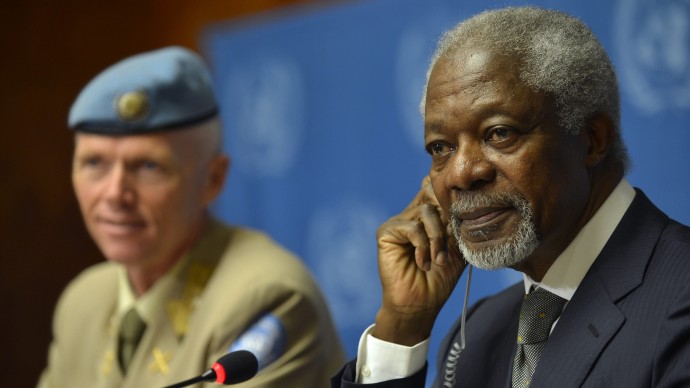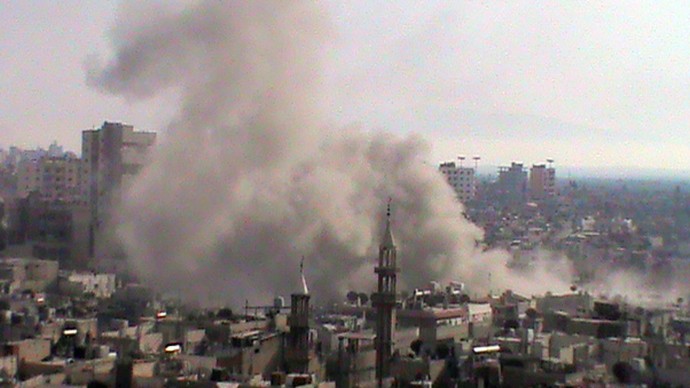
(BRUSSELS) – Should Iran play a role in the negotiations over Syria’s future? A disagreement has emerged between the U.S. and the EU over the answer to this question. Kofi Annan, the joint U.N.-Arab League emissary is trying to muster a new Syria “Contact Group” involving the United States, China, France, Russia, United Kingdom, Saudi Arabia, Turkey and, he hopes, Iran, to persuade Syrian President Bashar al-Assad to step down in return for immunity.
The United States, however, considers that Iran should be kept out because, it argues, the government in Tehran is helping President al-Assad.
“Iran has not demonstrated to date a readiness to contribute constructively to a peaceful political solution,” the United States’ U.N. ambassador, Susan Rice, said a few days ago. Washington has no diplomatic relations with Tehran since 1979, when Iranian revolutionaries stormed the U.S. embassy in Tehran. And divergence persists today over Iran’s political regime and its right to enrich uranium.
On their part, several European diplomats are of the opinion that Iran will be vital in getting al-Assad’s forces to play a part in a future transitional government. Contrary to the United States, the European Union has developed a tradition of dialogue with Tehran. The EU is one of Iran’s main trade partners. And, as a major gas producer, the country also represents an important source of energy and an alternative to Russian gas for the Europeans, a fact they are acutely aware of. Negotiations for an EU-Iran Trade and Cooperation Agreement were launched in December 2002.
These negotiations have been put on hold with the emergence of the so -called ‘nuclear crisis’ but relations have been maintained between the two parties. After long insisting on constructive negotiations to solve the nuclear file, the EU has more recently given in to American pressure and has imposed new sanctions on Iran — buying or shipping crude oil or supplying financial services, insurance and equipment to Iranian energy companies will be banned when the new decision enters into force on July 1.
In a speech to the European parliament, the EU High representative for Foreign Affairs and Security Policy, Catherine Ashton, has welcomed “the idea of a Contact Group of key actors on the Syrian crisis as announced by Kofi Annan”. Several EU diplomats also consider that EU’s open door with Iran is an important asset because it concerns Europe’s role in the world. Not all European governments agree though. The French foreign ministry, for example, has clearly announced that Iran will not be invited to a Friends of Syria meeting in the French capital on July 6. Foreign policy not being a European Union competence means a consensus will have to be found between the twenty-seven member states of the EU.
Beyond the EU-U.S. argument lays a more fundamental question: On what basis would Iran be excluded from a Contact Group on Syria? We think there are a few arguments that plead in favor of its inclusion:
First, Iran is almost a neighbor and, as such, directly concerned by what is happening in Syria. If things go wrong, it will be one of the first to be affected. Additionally, Iran is often considered as Syria’s main ally in the region as the two countries have both economic and political ties. Assad’s lay government and Iran’s Shiite Islamic Republic have shown their ability to conclude a pragmatic alliance against what they perceive as a Western attempt to dictate events in the region with the help of Sunni Muslim powers such as Saudi Arabia. It would therefore only seem natural to include Iran in negotiations on the future of Syria. And if Saudi Arabia is included in the Contact Group, there is certainly no valid argument to exclude Iran.
This leads us to a second consideration: It may be a good idea for the United States and the European Union to avoid giving the impression that Western countries, with the help of their Sunni Muslim allies, are once again trying to shape a country of the region to their best liking. Making Iran part of the talks can send an importance signal in that regard. Admitting or refusing Iran should not depend on unilateral ideological considerations.
Additionally, Iran has proven in the past that it can play a constructive role within its neighborhood. In Afghanistan for example, after the fall of the Taliban, Tehran was very helpful in brokering an agreement among the various Afghan factions to appoint Hamid Karzai to head a new government in Kabul. And Tehran also has been instrumental in rebuilding post-war Iraq through its links with the Shiite community there. Whether the West likes it or not, Iran is definitely a major actor in the region.
The West accuses Iran of supporting Bashar al-Assad and the bloody repression of its people. Iran on its part accuses the West of mingling in Syria. Iranian President Mahmoud Ahmadinejad recently said that the West’s interference has contributed to complicate the situation in Syria. The fact is that it remains very difficult to have a precise idea of what is happening on the ground. As is often the case with conflicts, there are several narratives which offer different explanations. These competing narratives by governments are generally aimed at serving their own agenda and demonizing the other party. There are no exceptions to the rule, and even though we may have a natural tendency to believe our ‘own’ government’s point of view, this does not mean it is right. Consequently, before throwing wild accusations, facts should be duly investigated in a truly independent manner.
One more consideration: A lack of knowledge about the ‘Other’ persists between Americans and Europeans on the one hand and Iranians on the other, probably leading to wrong perceptions and conclusions on both sides. Not everyone reacts, thinks or negotiates in the same way. Each country has its own culture and vision of the world. This does not mean that one is better than the other; it simply means that you have to be aware of it and be willing to take that into account. Otherwise, you may end up imposing your own vision of the world on the other. Not the best way to negotiate, and certainly something to ponder.
A conference between major powers is planned in Geneva on June 30 to establish the new Contact group, which has been called for by Kofi Annan. In the meantime, discussions are likely to go on between the United States and the Europeans.



